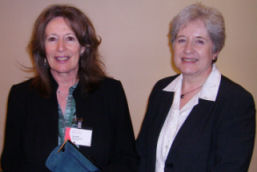The Network's 9th National Conference
Demand-Led? Meeting Employers’ Skills for Life Needs
Wednesday 7th February 2007, Crowne Plaza, Nottingham
The Network reflected the national shift in Skills for Life thinking by focusing on the employer at its ninth national conference. The one-day event - “Demand-Led? Meeting Employers' Skills for Life Needs” - drew more than 100 delegates to Nottingham's Crowne Plaza Hotel in February.
The impressive range of speakers and workshops underlined the importance
of the whole organisation approach in successful workplace Skills for
Life delivery. But the theory was always linked to existing structures
and the contemporary SfL scene with continual references to the Leitch
Report, Train to Gain, and Sector Skills Councils. One of the speakers
- Christine Ingall, Senior Policy Manager of the Learning and Skills
Council - referred to the stunning pace of change, saying there had been
as many new developments in the past three years as there had in the previous
10. “Language, literacy and numeracy learning and the organisations
within the field are moving so fast it is hard to keep up,” she
said. “But I believe we are basically on the right track.”
Eddie Little, The Network's Director of Operations, said: “The
one-day format, instead of our customary two days, worked extremely well.
Having the shorter time frame meant, I believe, that people's minds were
more sharply focused on the issues. As usual, the chance to network and
exchange ideas was one of the strongest aspects of the conference.”
Richard Beamish, Chief Executive of Asset Skills, kicked off the event
by making the business case for workplace Skills for Life. “Employers
must engage with SfL not for moral reasons but because it makes economic
sense for them to do so and because UK plc needs it,” he said. “Rentokil,
for example, after establishing 40 learning centres, has given 60% of
its employees access to education, saved £2.8m by reducing staff
turnover, cut staff injuries massively, and seen service quality rise
by 50%.” The SfL programmes for staff established by Serco, Remploy,
Pirelli Tyres and VT Shipbuilding were also highlighted.
The worry, he said was with small- and medium-sized companies, which had very few spare resources to fund training; it was them that Train to Gain needed to help. He added that the Leitch Report carried a threat with it: unless employers adopted SfL training by 2010, then they may be compelled to. The second keynote speaker was Alastair Pearson, Inspection Manager of the Adult Learning Inspectorate, who had a positive message: “When workplace SfL training takes place, it is usually of a high quality and works. We regularly see a 90% success rate, compared to one of 70% in colleges. Organisations and employees benefit in real and lasting ways,” he said.

Glenys Lake led participants on a journey through the painstaking stages by which a major organisation with an annual turnover of £470m - the construction company Edward Nuttall Ltd - had addressed its SfL needs. It had taken two years to reach a point at which the firm was fully behind the whole organisation approach. In a video, Sam Risker, the company's learning and development adviser, praised The Network's careful attention to detail. “Without them we could not have done this,” she said. “They have helped us adapt our own materials and have not rushed us. We have now made a real step forward in staff development.”
Kim Hailstone and Kim Coles explained the background to The Network's delivery of a SEEDA-funded pilot programme to highlight the little-known City & Guilds L Units. They explained that these are a highly effective way of plugging a “black hole” of knowledge which leaves vocational assessors bereft of information about how best to help staff with their LLN needs.
Other workshops covered the LSC's new basic Employability Skills training programme, Increasing SfL awareness in local authorities, the Get on at Work campaign, and Leicester College's take on how best to make SfL fit for purpose.




